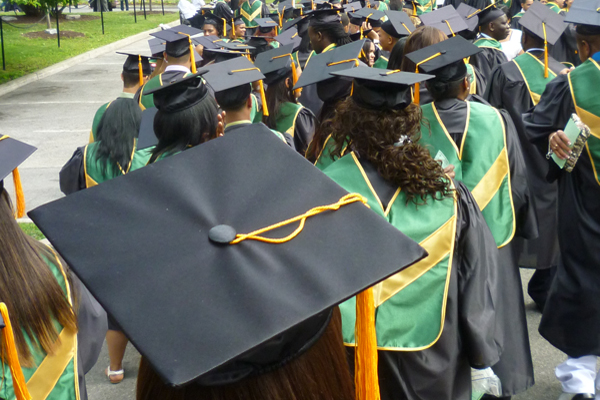‘As New York City looks toward investing in opportunities for people with justice involvement, it is imperative that they fund higher education services as a part of reentry. We must break down the barriers to opportunity for justice-involved people now more than ever.’

Jarrett Murphy
The first time I went to college I failed every class that I took. I was 18 and struggling with an addiction to heroin. Going to class was an afterthought because I was preoccupied by needing to avoid going into withdrawal. It wasn’t long before I found myself in handcuffs, sitting in a cold jail cell.
But this year, I am graduating with honors from the same college that expelled me all of those years ago. I don’t know that I would be the same person I am today if I hadn’t endured each obstacle along the way. Some of the most difficult moments I experienced taught me the most valuable lessons. When I sat in jail, I knew that I had a decision to make: I could either get clean and get my life together or continue this lifestyle and die.
Now, I am five years sober and have a bachelor’s degree. I wholeheartedly recognize my privilege to transform such a negative, traumatizing, and inhumane experience like jail into something that has turned my life around. However, the sad reality is that jail is a place too often used as a warehouse for individuals we as a society just do not want to treat. The majority of those ensnared in our criminal legal system are people who didn’t have the same opportunities that I did.
Some research shows that 65 percent of those incarcerated in the United States struggle with substance use disorders. Instead of offering treatment for addiction or opportunities to go to college or find employment, our system imprisons people and then locks them into a lifetime of collateral consequences that hinder them from finding affordable housing, attending school, and finding employment. According to the surgeon general, only 1 in 10 people struggling with addiction actually receive treatment. Meanwhile, 1 in 3 people in the United States have had contact with the criminal legal system.
But we need not imagine what is possible when those we lock away gain access to education and opportunities. My fellow justice-involved graduates and I are living proof of what is possible. We all have our unique journeys, and we have faced more hardships than most. But when we gained access to all of the resources we needed to thrive, we rose to the challenge and earned associate’s, bachelor’s, and master’s degrees in a system rigged against our success.
Community-based organizations like College & Community Fellowship were crucial in helping us mitigate the burdens of navigating our country’s higher education systems as justice-involved women. Without the resources, one-on-one counseling, and scholarships that CCF offered, college may have been out of reach for many of us. But with the support of a community of other justice-involved women, we earned our degrees, took back our power, and are now looking forward to making our dreams come true.
As New York City looks toward investing in opportunities for people with justice involvement, it is imperative that they fund higher education services as a part of reentry. We must break down the barriers to opportunity for justice-involved people now more than ever. The impacts of increasing access to higher education reverberate across generations and throughout communities opening doors to more employment opportunities, more social mobility and more people transforming their lives.
For me, this is a graduation 10 years overdue. Many of us feel as though we have had to play catch up with those who didn’t face the obstacles that we did, but that only makes our achievements more special. Today, we celebrate our hard-won achievements and tomorrow we work to open doors for others to do the same.
Camilla Broderick is a recent graduate from CUNY’s John Jay College of Criminal Justice and 2021 Salutatorian at College & Community Fellowship, a non-profit that helps justice-involved women gain equitable access to opportunity and higher education.








